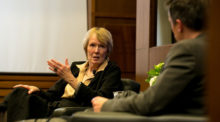Daviel Lazure-Vieira
After ten years as the warden of St Antony’s College and professor of international history at the University of Oxford, Margaret MacMillan is coming back home. The reputed scholar and former provost of Trinity College has returned to the place where she began her training as a professional historian in 1962. A distinguished fellow at the Munk School of Global Affairs and Xerox Foundation distinguished scholar at the Henry A. Kissinger Center for Global Affairs at Johns Hopkins SAIS, MacMillan is also teaching in the Department of History at the University of Toronto.
MacMillan’s contribution to international history includes some eleven books, most notably Paris 1919: Six Months That Changed the World, Dangerous Games: The Uses and Abuses of History, and The War That Ended Peace: The Road to 1914. She specialized initially in British imperial history, but her wide-ranging academic interests have led her to look at many different aspects of international relations in the 19th and 20th centuries – from the First World War to the relationship between the United States and China in the Nixon era.
Despite her focus on major global events, she tells stories in the plural form, looking at the role played by key historical figures such as Woodrow Wilson, Georges Clemenceau, or Lloyd George. “Looking at individuals is a way of connecting with the past, of understanding the social, political, cultural, and economic conditions of a particular world at a particular moment in time,” she says. “Of course, the past is full of great currents, but it’s important to remember those who lived through them. The task of the historian is to recover the voices of leading figures who had a crucial impact in shaping our world, but also the voices of those who weren’t encouraged to express themselves.”
Although MacMillan’s best-known work focused on the difficult process of making peace, she has now turned her attention to war, the subject of her upcoming talk on February 14 as part of the Munk School’s Distinguished Lecture series. “We tend to regard war as an aberration, something that stands apart from normal society,” she says. “I don’t think it is. War is very much embedded in human history, and yet it feels like we don’t want to hear about it in liberal democratic societies. Most of us will never experience war, and we like to think ‘it happened over there,’ without confronting it directly. But the generation of my parents certainly knew what it was like; migrants and refugees who are coming to Canada do too, it is an important part of their own personal experience.”
Why does the international order break down in times of war? It’s a thorny question that MacMillan can only hope to begin to tackle during her lecture. “There are times when we have to deal with ruptures, like wars, revolutions, great depressions, when things are radically different afterwards. The world of 1914 wasn’t the world of 1919. I’m interested in how war disrupts the established order and brings about change while being driven by change.”
Are we living in such an era of rupture? It’s hard to tell, says MacMillan, even if the current tides embodied by Brexit or the election of Donald Trump in the United States certainly make it seem that way. She explains that this sense of disengagement from a world order that has prevailed since the Second World War may speak to our failure to remember the past – and in particular, a failure to remember the reason why institutions like the United Nations or the European Union were created in the first place. “My generation grew up in the immediate aftermath of the war, and we understood very clearly the necessity to cooperate because we knew what happens with the collapse of the international order. Time goes by and people forget – but as our generation begins to disappear, we must remind ourselves of the importance of coming together, just like we must understand what made us come apart.”
Margaret MacMillan’s lecture “War and the International Order in the 20th Century” will be broadcast live online on February 14, beginning at 6:00 p.m. EST. Watch the livestream.
